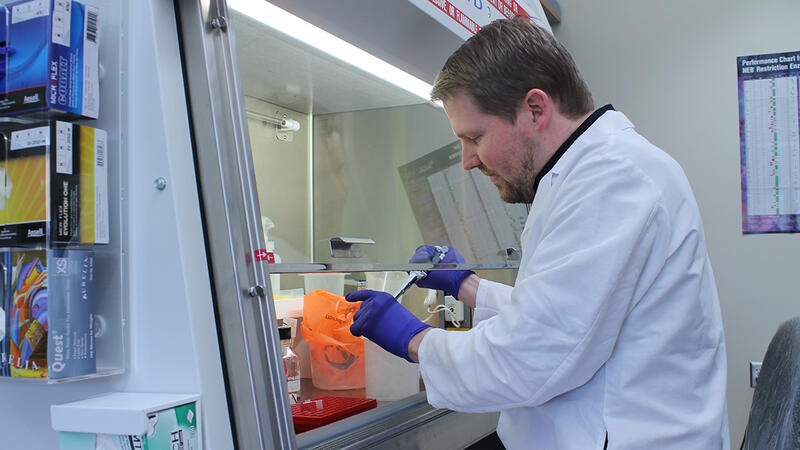News
Sustainable Biomass Conversion
Genetic toolkits boost biofuel production
Microbes devour plant material, like leaves and stems from native plants, and convert it into biofuels and bioproducts. But in the process, the deconstructed plant material releases toxins that get in the way, creating one of the challenges to making biofuels an efficient and economical alternative to existing fuels. GLBRC co-investigator Jason Peters and his team are building tools to help make the microbes more resilient.
Two scientists with the Great Lakes Bioenergy Research Center have been elected to the American Academy of Microbiology.
Great Lakes Bioenergy Research Center co-investigator Daniel Amador-Noguez was recently awarded a Presidential Early Career Award for Scientists and Engineers, the federal government's highest honor for early-career scientists and engineers.
Grace Gooley is a senior at the University of Wisconsin–Madison majoring in chemistry and environmental studies. She’s working on her senior thesis in the Ive Hermans lab, where research focuses on the sustainable synthesis of chemicals using catalysts with the goal of producing commercial compounds in ways that generate less waste, consume less energy, or emit less greenhouse gases than existing techniques.
UW–Madison professor Holly Gibbs was recognized for outstanding contributions to understanding of global environmental change, while Jiquan Chen, a professor at Michigan State University, was honored for a distinguished record of research that has advanced the discipline of geography.
Transcription factors are proteins that bind to DNA inside a cell, activating or blocking the expression of a particular gene. Accurately predicting these gene regulators is a key step to making more productive and stress-resistant crops. But the complex interactions between DNA, RNA, and proteins within cells make this difficult, and scientists lack comprehensive datasets for most crop species. Therefore, scientists with the Great Lakes Bioenergy Research Center developed a user-friendly pipeline to identify the transcription factors that regulate target genes associated with important traits.
An Italian academy that once counted astronomer Galileo Galilei as a member has recognized a Great Lakes Bioenergy Research Center scientist for her contributions to plant science.
Inspired by the GLBRC, a middle schooler from Utah designed an experiment to test how enzymes affect the production of cellulosic biofuel.
GLBRC postdoc Blaise Manga Enuh published an essay in The Conversation about his work on a genome-scale metabolic model of Novosphingobium aromaticivorans, a bacterium that can convert very complex chemicals in plant waste to valuable bioproducts.
Isobutanol is a promising biofuel with advantages over ethanol: it holds more energy, is less corrosive, doesn't evaporate as fast when blended with gasoline, and can be upgraded into other products like jet fuel. But making isobutanol from non-food plant fibers is challenging. This study estimated a biorefinery could produce isobutanol for a break-even price as low as $14.40 for the energy equivalent of a gallon of gasoline and showed how improvements in some parts of the process could cut that cost by nearly half.
Junior biology major Lizza Korolev is an undergraduate research assistant in the Sato lab, where she studies yeast with the goal of developing strains that can ferment sugars in switchgrass into sustainable biofuels.





